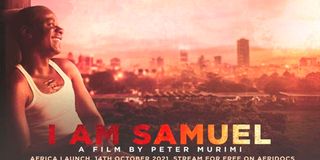I am Samuel, kindly respect and protect my right to be

The film 'I am Samuel' tells the story of a queer man navigating the tension between his life in Nairobi and his rural childhood home.
What you need to know:
- KFCB is silencing a real Kenyan community and trampling on our rights as filmmakers to tell Samuel’s story.
- The arts hold a mirror up to society and show us some of the difficult realities that we often try and shy away from.
I may not agree with what you say but I’ll defend to the death your right to say it. Voltaire’s quote is our fallback when asked about freedom of expression. Allowing storytellers to tell stories, no matter whether you agree with them or not, is a move towards greater inclusivity.
The discriminatory language used by the Kenya Film Classification Board (KFCB) in banning I Am Samuel as “blasphemous” and “unacceptable and an affront to our culture and identity” is disturbing. Shot over five years, the documentary tells the story of a queer man navigating the tension between his life in Nairobi and his rural childhood home.
The restricted classification of the film contained a number of inaccuracies. It referenced a “marriage” that never happened and said we were “promoting a homosexual lifestyle”. We were simply filming people’s lived experiences. KFCB is silencing a real Kenyan community and trampling on our rights as filmmakers to tell Samuel’s story.
Every story is important. And we are all equal in the eyes of the law and before God, in line with the religion the film board is invoking in this ruling.
The arts — from filmmakers and novelists to painters and comedians — hold a mirror up to society and show us some of the difficult realities that we often try and shy away from. Kenya is Africa’s third-biggest film producer after Nigeria and Ghana, making 500 films a year. Its filmmakers are attracting global acclaim. Director and AMPAS member Wanjiru Njendu’s short film, Stray, screened on the Hulu Network last year. Wanuri Kahiu is directing a slew of Hollywood studio television series and films. Softie, directed by Sam Soko, won an editing award at the prestigious 2020 Sundance Film Festival. The Letter, directed by Maia von Lekow and Chris King, was entered in the Oscars last year.
The UN recently said the African film and audio-visual industry generates $5 billion (Sh500 billion) a year and can create 20 million jobs.
I Am Samuel is the third lesbian, gay, bisexual, transgender and queer (LGBTQ+) film to be banned by KFCB, after Stories of Our Lives (2014) and Rafiki (2018). Other movies it has banned include The Wolf Of Wall Street (2014) and Fifty Shades of Grey (2015).
KFCB is trying to censor a part of Kenya that has always existed, is a lived reality for millions and will always be a part of us. Several high-profile Kenyans are queer but the intolerant atmosphere makes it impossible for them to live openly. As I Am Samuel shows, prejudice forces LGBTQ+ Kenyans to live in the shadows, fearful of being beaten up, fired from their jobs or evicted from their homes. Stigma puts pressure on their families, who fear ostracisation.
In their press statement, the KFCB appealed for content that “promotes Kenya’s moral values and national aspirations”. What are these values? But Kenya is diverse and it is the responsibility of our government to represent and serve everyone. Our differences should be acknowledged as a strength.
Samuel is a strong Christian and Kenya has several LGBTQ+-friendly churches which provide a place for queer Kenyans to worship together. Let the government accept and support our creative industries and allow every Kenyan’s voice to be heard.
Mr Murimi is director/producer and Ms Kamau is producer of the film ‘I am Samuel’.




